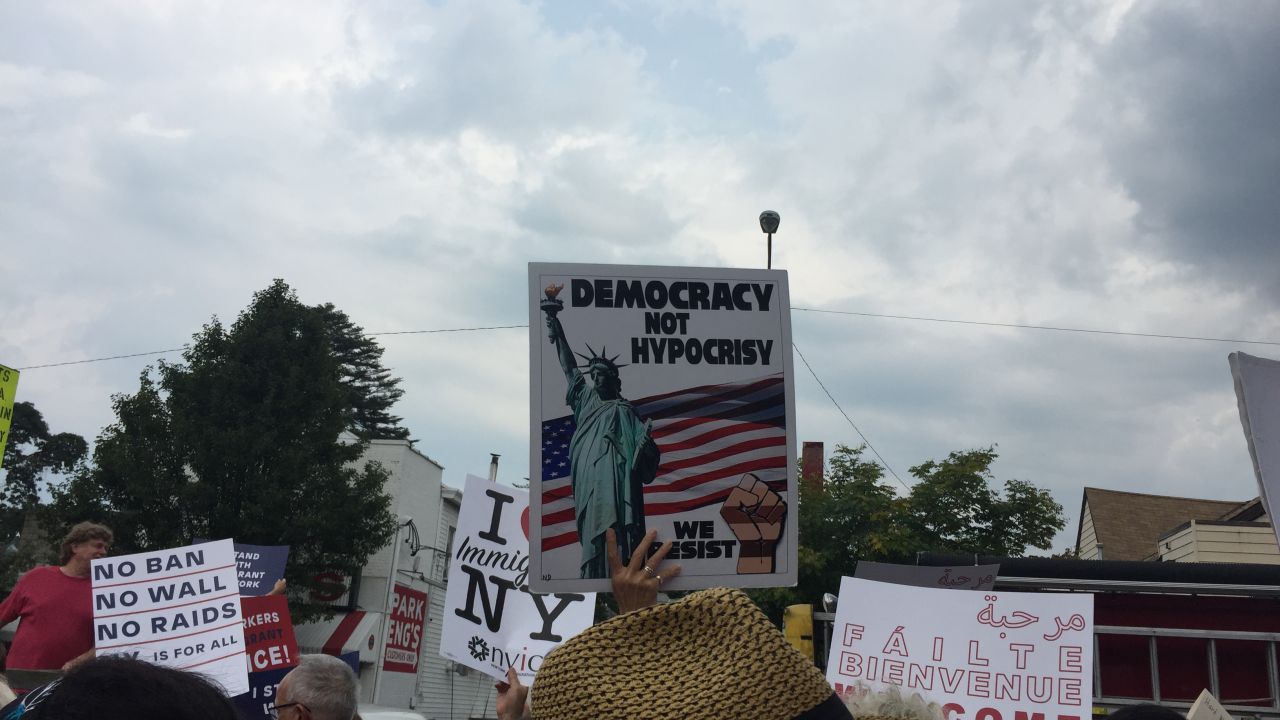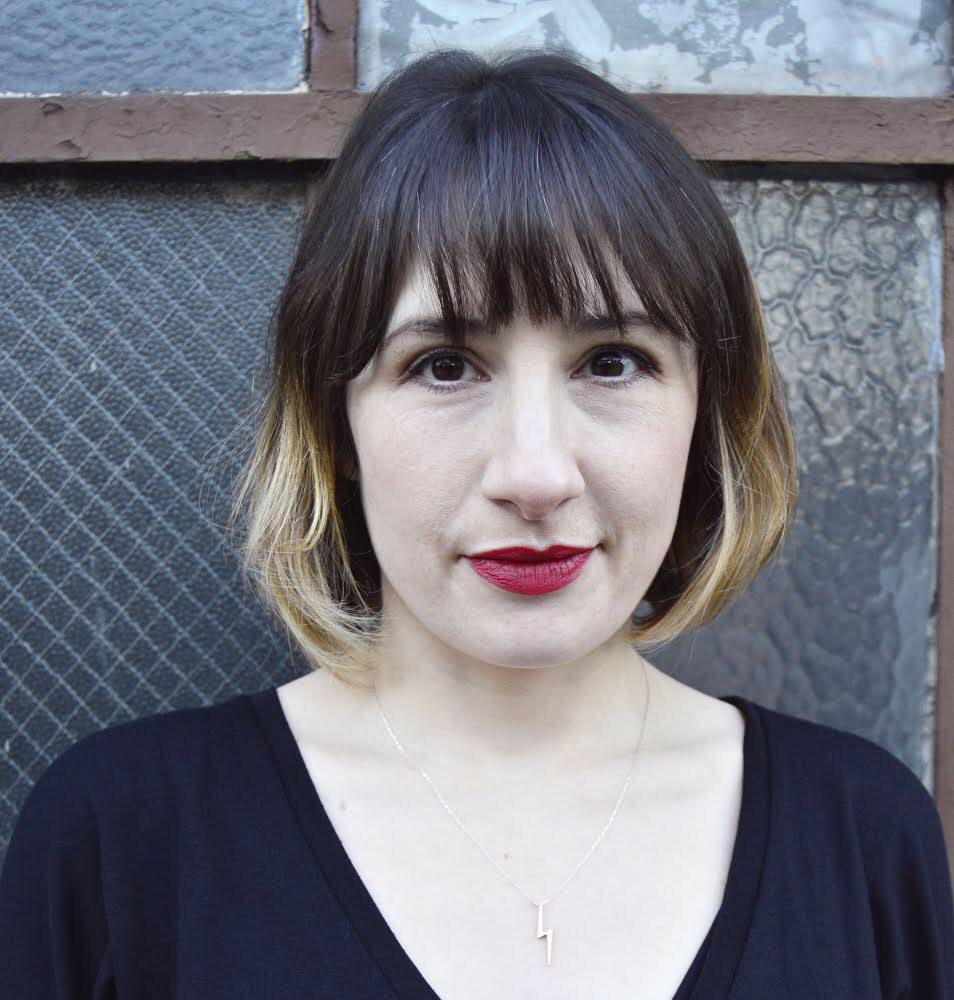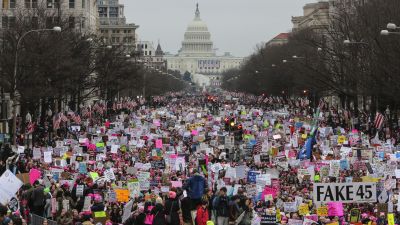
DACA protest outside the office of Rep. John Faso (R-NY) in Kingston, New York on Sept. 5, 2017. (Photo by Sarah Jaffe)
This Q&A is part of Sarah Jaffe’s series Interviews for Resistance, in which she speaks with organizers, troublemakers and thinkers who are doing the hard work of fighting back against America’s corporate and political powers. This interview has been edited for length and clarity.
On Tuesday, Sept. 5, the Trump administration announced a “phase-out” of the Deferred Action for Childhood Arrivals (DACA) program for immigrant youth. This decision leaves hundreds of thousands of young people vulnerable to deportation — young people who voluntarily gave the government personal information about themselves in order to gain protections in the first place. Around the country, emergency protest rallies were held. At one, in Kingston, New York, outside the office of newly elected Republican Rep. John Faso, Sarah Jaffe spoke with two immigrant organizers about the decision to revoke DACA. Alan, who is with Nobody Leaves Mid-Hudson (Nadie Se Va Del Mid-Hudson en Español) prefers not to use his full name because of his immigration status. Renee Oni-Eseleh is an activist, organizer and artist with Community Voices Heard.
Sarah Jaffe: So, Alan, we’re outside of Rep. John Faso’s office at a rally for DACA. Tell us your story.
Alan: I came to this country very young; over two decades ago, my family brought us here. I started kindergarten and went through all the way to high school. Everything was working fine and I didn’t worry about my status. It wasn’t until I was 16, when I wanted to get a driver’s license just like everyone else, that’s when it hit me that I didn’t have papers to show. I let that slide, I thought “OK, I can live without that.”
Then when I was trying to go to college, my counselor was telling me, “Do the FAFSA Federal Student Aid application, you have good grades, don’t worry about it, you’re in.” But when I found out that for FAFSA (Federal Student Aid) you need a Social Security number, you need a legal primary residence [then I couldn’t apply]. I still went to college and for a couple of years it was kind of hard — it got expensive. It was good that New York had in-state tuition, that’s a great thing, but I needed to bring my parents’ taxes, passports, all these type of IDs just to prove residency. It was also very embarrassing for me when everybody else showed their license and I had to show a passport, because everybody found out that I was undocumented.
My major is engineering, and I’m still in school for that. I’m an industrial technician with a very good job, but I’m afraid of losing it. I’m happy now, I’m content, but you know that DACA’s going to end pretty soon — so what if when it ends my employer is going to ask for my papers and I can’t show them anything? I will lose a pretty good base salary and then go back to hiding. I don’t want to do that anymore. I feel that the country needs to unite and pass bipartisan legislation.
— Alan
There are lot of things going on and one of them is racism. I can’t see it any other way. I took economics for that reason, to understand the economy of this country. The numbers are there, immigrants will raise the economy up. They keep saying, “America First, America First.” I just don’t get that because there are jobs, Americans aren’t going for them. That’s what the visas are, immigrants coming in to fill those spots. We are the minority now and we’re going to become the majority eventually and they’re afraid of that. My parents are not criminals. They’re not.
SJ: You mentioned, and I think it’s an important point, how much money DACA recipients paid to get DACA. For people who don’t know how it actually works, tell them what you had to do to get this protection that Trump wants to take away?
A: The fee is around $465 — that includes biometrics and applying for a work permit. We pay for everything, there are no fee waivers. There’s 800,000 DACA recipients, and that’s just lowballing, if you do the math: 800,000 times $465 comes out to nearly $400 million. That’s a lot of money into the economy. That’s not counting when you go to purchase a car, that’s not counting when you go to get a driver’s license or pay taxes. It’s a lot of money for a low-income household.
People have to really understand our struggle in order for them to do something about it. Everybody says “Oh, just apply for citizenship.” But they don’t know how hard it is. They keep telling me, “Just be a legal resident” — they don’t know how hard that is, especially now that the fees are going up. The fees are going up to $725 to become a citizen, and to become a legal resident it’s even more.
SJ: What can the state of New York do, if the federal government is going to eliminate DACA? Is there something you would like to see the state government do?
A: Yes. Take the “Temporary Visitor” off our licenses. If that expires we can’t renew our licenses because we are required to bring paperwork from the Immigration and Naturalization Service, which we don’t have. If Gov. Andrew Cuomo (NY-D) was in front of me, I would tell him to take the temporary visitor mark off.
And protect our information. Even though the federal government has our information, just protect us in your state by not taking away our license when it expires.
SJ: What would you say to Rep. Faso if he popped his head out of the office and came to talk to people?
A: Listen. I would definitely tell him to listen and help us out. Read about DACA, read the benefits, don’t just listen to Fox News. There’s a lot of immigrants in this community, in the mid-Hudson Valley. Help them out, not just for economic purposes. Kingston would grow economically but also morally.
SJ: Tell us how you got involved with Nobody Leaves Mid-Hudson?
A: I’ve done work with Rural Migrant Ministry, farmworkers advocacy, so I’ve been in this type of group before. The main organizer, Ignacio, said “Listen, you’re a DACA recipient, I need your voice, not just for Kingston but for many.” That’s what I’m doing here.
SJ: Anything else you want people to know?
A: We’re humans. Treat us like humans. Treat us like citizens — not of the country — but citizens of the world. That’s what I want. I am tired of people saying “What are you?” I’m human. Treat me like one.
SJ: We’re outside of John Faso’s office — give people a short version of your story.
Renee Oni-Eseleh: Basically, I am what happens without DACA. I didn’t get DACA, I was two months too old for it, and I missed out on being able to go to school. I don’t have a work visa and I haven’t been able to work for a year.
— Renee Oni-Eseleh
SJ: It often happens that different groups of immigrants get played off against each other as “good” and “bad.” I wonder if you could speak to that.
ROE: I am part of a forgotten demographic of immigrants, black immigrants tend to be completely left out of the conversation. It’s not at all right to play any of us against each other because we’re literally all in the same position. There are different benefits with the immigration system depending on where you come from, but that’s not our fault, that’s the American immigration system. I think that as immigrants we need to come together, as our own bloc of people and say “We’re here, we are some of the biggest contributors to American society, we start many of the businesses and we get the job done.”
SJ: Talk about how you got involved with Community Voices Heard.
ROE: It started with going to the Millions March in New York City as a protester. I went to the Women’s March, and got this feeling that now was the time to take control of our destiny and make our voices heard. I would really rather do anything else but at this moment in history I have to speak out or I will fall by the wayside.
SJ: In New York, what can be done on the local level if the federal government is in Trump’s hands?
ROE: I live in Poughkeepsie. I helped get safe city legislation passed in my city by showing up to Common Council meetings, by meeting the mayor, befriending him on Facebook and by talking to people that I know locally. I was making sure that people know that I’m here and this is a concern that I had and help put a human face on an issue.
SJ: We’re outside of Rep Faso’s office; if he were to actually come out and talk to you, what would you say to him?
ROE: I would say that it is cruel to dangle DACA in front of so many people’s eyes and then snatch it away. I would say that it’s short-sighted and fiscally irresponsible to get rid of something that’s actually making a lot of money. It’s a cruel and unusual situation to put people who have done nothing wrong but show up and are trying to live their lives into a situation where you’re telling them that they don’t deserve anything.
SJ: What else do you want people to know?
ROE: I want people to know that we’re just people. The strain of being undocumented for a really long time puts a lot of stress on you mentally. I’m very outspoken but I know that it’s because I’m a strong person, I speak for the people who can’t speak for themselves. I just want people to know that we’re here and we aren’t trying to take anything from you, we’re trying to add to the whole melting pot.
Interviews for Resistance is a project of Sarah Jaffe, with assistance from Laura Feuillebois and support from the Nation Institute. It is also available as a podcast on iTunes. Not to be reprinted without permission.




